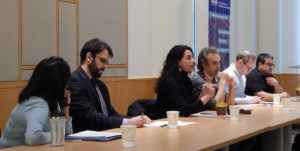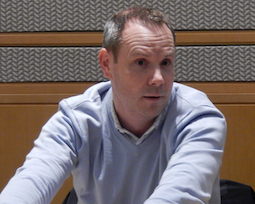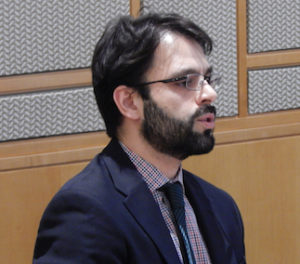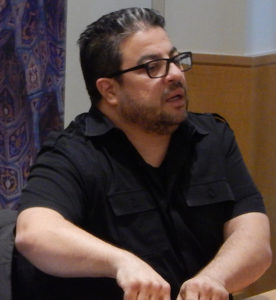On Thursday, February 9 The Ali Vural Ak Center for Global Islamic Studies at George Mason University, in conjunction with the Middle East and Islamic Studies Program, hosted a town hall titled “Perspectives on the Immigration Ban.” The Center organized the town hall as a response to the confusion and questions surrounding Executive Order 13769, titled “Protection of The Nation from Foreign Terrorist Entry into the United States” and more commonly referred to as the “Muslim Ban,” signed on 27 January. The town hall brought together six Mason faculty members to put the ban under scrutiny from multiple angles in conversation with the audience.
The first speaker, Noura Erakat, discussed the extent and limits of presidential authority to enact the ban, the administrative process through which the ban was created, and the ban’s current legal standing within the judicial system. In regards to the president’s authority, Dr. Erakat made clear that the president had legal and constitutional power to restrict immigration and travel, but also noted the necessity of compelling reason for such a ban to be enacted. Professor Erakat concluded that the ban will likely not withstand strict scrutiny as drafted for being overly broad with no definite security threat; however, it could be amended to circumvent the legal constraint.

[Noura Erakat addresses the legality of the executive order and its implementation.]
The next speaker, Peter Mandaville, discussed the ban in regards to national security, whether it serves the administration’s stated desire of targeting terrorists. He stated that although the ban targets seven Muslim majority nations considered terror-prone, none of the terrorists that have attacked the US came from these countries. Dr. Mandaville argued that the ban implicitly provides for privileged access of Christian immigrants and refugees after the ban expires, indicating a new religiously based form of immigration to the United States. Dr. Mandaville concluded that the ban aims to solve a problem that is not there.

[Peter Mandaville discusses the travel ban’s implications for national security.]
Next, Huseyin Yilmaz discussed the ban within a larger historical context in which cultural identities were securitized in response to broader problems. Dr. Yilmaz argued that the current policy environment reflected the nineteenth century “Eastern Question” where western European states framed their relationship with the then Near East as a security question whereby Muslims were seen as inherently different, inferior, and violent. He pointed that, as reflected by Huntington’s clash of civilizations thesis, since the end of the Cold War, cultural differences have been exploited to identify culprits for ongoing troubles ranging from unemployment to income inequality.
In regards to the domestic impact of the ban, Ahmet Tekeliogludiscussed the Muslim community in America, including the significant number of Muslim non-citizens. He explained that among non-citizens, increasing fear reflects the community’s vulnerability, fears that have also increased within community members that hold US citizenship. Dr. Tekelioglu drew attention to the highly diverse nature of the Muslim American community that parallels the diversity in Christian or Jewish communities. He emphasized that, in the future, the likely drawdown on federal civil rights watchdog units will serve to increase fears and vulnerabilities still further.

[Maydan Editor Ahmet Tekelioglu discusses the impact felt by American Muslims as a result of the immigration ban.]
Finally, Sumaiya Hamdani discussed the historical background of the executive order, which came from a series of deep, long-standing maneuvers and strategies, deeply-rooted in an antipathy towards Muslims. Dr. Hamdani emphasized that Identification of parts of the Middle East and North Africa region as “bad Muslims” can be seen in the ban which purports the view that residents of “failed states” and “rogue states” being especially prone to be stigmatized as “bad Muslims.”
Bassam Haddad, as moderator, concluded the lecture portion of the panel before opening the room for questions. Focusing on the larger foreign policy of the Trump administration, Dr. Haddad argued that new strategies indicate a degradation of policy on the MENA region, with terrorism being the clear focus. He stated that the ban itself is unlikely to produce the stated effects and actions. Instead, because of the ambiguities in the language of the executive order and the stated goals of the administration, it will likely sow uncertainties and grey areas that may create further troubles and vulnerabilities.

[Bassam Haddad outlines how the travel ban reflects a shift in US foreign policy toward the Middle East.]
During the town-hall portion of the event, the attendees conversed with the panelists on various aspects of the immigration ban, including its legality, policy goals, and public reaction. The panel served as an informative and critical platform to discuss the context, language, and effects of the ban. Covering a broad range of relevant issues from multiple perspective, the panel provided a holistic picture in hopes that the audience could be better informed of the nuances that shaped the ban and its effects. The panelists and the participants argued that similar programs should be organized in the future to exchange views, share experiences, and explore the question from multiple angles.
[This report is published in partnership with www.TheMaydan.com]